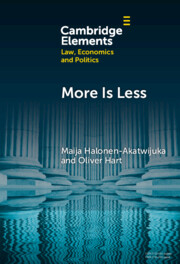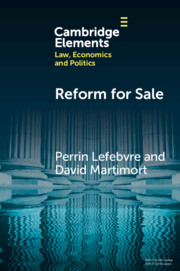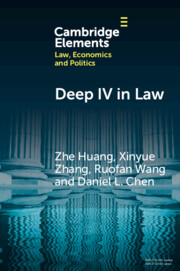About the Elements in Law, Economics and Politics series
Decisions taken by individuals are influenced by formal and informal institutions. These arrangements determine the nature, scope and operation of markets, organizations and states. A large literature has studied their functioning, determinants and impacts. Yet, this strand of research has produced contrasting theories and proposed contradictory policy conclusions.
The Cambridge Elements in Law, Economics and Politics is aimed at organizing the existing knowledge and guiding research on the origins and evolution of economic, legal and political institutions and their role as a possible determinant of economic phenomena. To achieve this goal, we focus on two types of contributions:
In both cases, an Element must be based on either a formal theoretical model or a theory-based empirical strategy.
Five are the key innovative features of our editorial project:
1. Each contribution is indexed as a Cambridge University Press monograph and should range between 20,000 and 30,000 words but cannot be shorter than 10,000 words. It will be made available in online, e-book and printed versions and offered open access for the first two weeks after publication.
2. Each contribution encompasses a piece of extra material such as a summary video, theoretical exercises, an unpublished data set, policy prescriptions, and reading lists facilitating its inclusion in graduate and undergraduate courses.
3. Our editorial board is composed by a group of young but highly recognized scholars who have developed methodologies at the crossroads between archaeology, biology, computer science, economics, history, law, management science, political science, psychology and sociology. Building on this unique mix of expertise, we invite interdisciplinary contributions enhancing our understanding of the origins and impact of legal and political institutions.
4. We commit to provide a very meticulous editorial process and, notably, the feedback of two co-editors, two associate editors and one external reviewer.
5. We strive to enhance the visibility of each published Element through our blog and our Facebook, LinkedIn, Youtube, and Twitter channels.
To get in touch with the Series Editors for the Elements in Law, Economics and Politics series, please email the Managing Editor, Valentino Moscariello, at LEPelements@gmail.com and the Editor in Chief, Professor Carmine Guerriero, at c.guerriero@unibo.it.
Keep up to date with the latest news from the series on our blog, Twitter, Facebook and LinkedIn.
See the latest metrics:
|
| Average per year |
| Number of tweets | 12.8 |
| Number of full text views | 682.7 |
| Number of abstract views | 930.7 |
| Number of citations on Google Scholar (from the publication date) | 7.7 |
| Data retrieved on 24/09/2023 |
Being defined as the yearly mean number of citations of the Elements published in the last two years, the number in bold can be seen as our actual impact factor.



The Elements in Law, Economics and Politics series editors welcome contributions employing the most advanced methodologies in biology, economics, law, management, political science, psychology, and sociology, and falling under one or more of the following tracks:
1. Theory (Alessandro Riboni);
2. Evidence (Jillian Grennan and Tara Slough);
3. Policy (Petros Sekeris).
You can find more information about each track in the Areas of Interest tab.